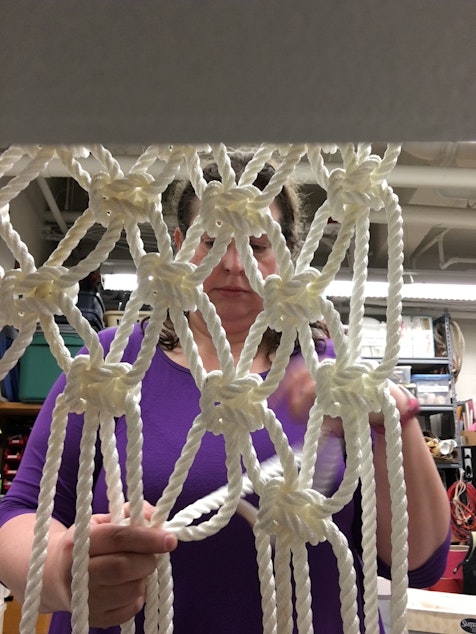Thousands of Seattle-area cultural workers wonder if they'll ever return to work as pandemic drags on
Tristan Hansen remembers exactly where she was six months ago: getting ready to open a show at Seattle’s 5th Avenue Theatre.
“We were three days away from having an audience for 'Sister Act,'” Hansen says. “We were in the thick of it!”
Hansen is the 5th Avenue Theatre’s props master. She’s one of hundreds of technical workers and craftspeople who spend months creating sets, costumes, lighting designs and more for each big musical the 5th Avenue presents.

Three weeks after the first Washington resident died of Covid-19, Governor Jay Inslee mandated restrictions on social gatherings in mid-March. Hansen and her colleagues began to worry about their jobs.
“We kind of whispered to each other, ‘Oh, something’s going to happen!’ And then something did happen,” she says.
Theater managers called the team together and told them the show would not go on as planned. The 5th Avenue Theatre wasn’t alone.
Sponsored
As the pandemic escalated in March and April, thousands of cultural workers and artisans lost their jobs; by mid-May, more than 5,000 were out of work in the Seattle area, according to data collected by the Seattle-based arts advocacy and funding group Arts Fund. Although some businesses have begun to reopen, theaters and other performance venues remain closed.
Jennifer Bacon, the president of IATSE Local 15, the union that represents Seattle-area stagehands and other backstage technical workers, says most of her 1,000+ members have run through their initial unemployment benefits and are now applying for extended assistance.
“At least 90% of our people are not working right now,” Bacon says. “They have to do some additional job search for the 20-week extension, but there are no jobs.”
Some have been able to transfer carpentry or other skills to private sector jobs. Tristan Hansen has been crafting jewelry and marketing it on her Etsy site. But she says there’s no way she can sell enough jewelry to replace the union wages she lost.
“I’m going to have to start pushing resumes,” Hansen says. “I may end up at Joanne’s Fabrics. I just don’t know.”
Sponsored
Theater administrators like Bill Berry, the 5th Avenue Theatre’s artistic director, worry that losing skilled craftspeople like Hansen would be a second blow to an industry that’s been crippled by long-term closures.
“How do we make sure, as we get to the other side of this, that we still have the highly skilled labor force that is the backbone of our industry?”
Unfortunately, Berry and his colleagues have no idea when they’ll reach “the other side” of the pandemic. He won’t even venture a guess.
“The mistake we made early on was saying, ‘Oh, we’re going to try to do this on this date’,” Berry says. “We’ve sort of targeted next fall as the earliest we can consider bringing live people back in.”
The 5th Avenue Theatre opened in 1926, presenting musical revues and silent films. It’s now best-known as both a stop for touring Broadway musical productions, and an incubator for award-winning musicals like “Hairspray” and “Come From Away.”
Sponsored
The theater has lost millions in ticket revenue since it was forced to close last March. To ride out the pandemic, it slashed more than half of its annual budget. But the impacts of the 5th Avenue’s indefinite closure ripple beyond the organization itself. Downtown establishments that catered to pre- and post-theater crowds are also hurting.
“There are restaurants that aren’t open anymore,” Tristan Hansen says. “This is livelihoods! This is huge!”
IATSE Local 15 President Jennifer Bacon says the health of Seattle’s hospitality industry is closely aligned with the arts and entertainment sector. A recent King County survey noted that cultural enterprises accounted for more than two billion dollars annually in direct and indirect jobs.
“And a lot of times, that multiplier effect isn’t recognized,” she says.
While many local cultural groups received some financial assistance from local, state and federal sources last spring, arts and entertainment industry leaders are asking for more. Bacon believes a long-term pandemic calls for long-term help, including wage replacement. She points out that many European governments provided direct aid to their cultural institutions, staving off the persistent unemployment prevalent in the American arts community.
Sponsored
Seattle’s Democratic Congressional representative, Pramila Jayapal, agrees the federal government needs to do more for artists and arts organizations.
Last spring Jayapal sponsored the Paycheck Replacement Act; it would provide direct grants to individual artists, and to businesses including nonprofit arts organizations. Unlike the Paycheck Protection Program, Jayapal’s bill would not require grantees to repay the money.
Jayapal remains hopeful about her bill’s prospects, but given the partisan bickering in Congress, the Paycheck Replacement Act’s future is unclear.
Meanwhile, as she enters her seventh month of unemployment, Tristan Hansen can’t spare much time for the political machinations in Washington D.C. She’s worried about how she’ll pay the mortgage and health care costs when her benefits run out at the end of this year.
And, Hansen, a single mother, says she tries to remain upbeat around her 5-year old daughter. It’s not always easy.
Sponsored
“I can’t express to her how hard it is not to be going to the theater every day,” Hansen says. “She climbed her first stairs at the 5th Avenue Theatre. That is our life.”
The pandemic threw that life completely off kilter. Tristan Hansen dreams of the day when balance is restored to her world.




